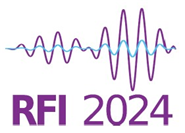
Bariloche, Argentina
published May 08, 2025
Spectrum sharing has become challenging due to the ever-growing demand for spectrum access by a wide range of emerging radio services. This in turn leads to an increased risk of Radio Frequency Interference between spectrum users. This is particularly true for passive scientific services such as radio astronomy, Earth remote sensing, or meteorology, where sensitive measurements must be carried out in frequency bands defined by the laws of nature.
Protecting the scarce radio spectrum resources for science, while accommodating the needs of other spectrum users, can only be achieved in a joint effort. RFI 2024 offers the venue to promote interaction, exchange of ideas, and cooperation between researchers, engineers, and users from all radio science disciplines dealing with RFI, uniting them under the common goal of working on solutions to minimize the impact of interference. RFI 2024 is the seventh in a series of workshops focusing on this topic, the first of which took place in Bonn, Germany, in 2001.
Editorial board
Alexandra Bringer, ElectroScience Laboratory, alexandra.bringer@gmail.com
Ashley Vanderley, NSF, bevander@nsf.gov
Balthasar Indermuehle, CSIRO, Balt.Indermuehle@csiro.au
Federico Di Vruno, SKAO, Federico.DiVruno@skao.int
Flávio Jorge, flavio.jorge@ext.esa.int
Greg Hellbourg, Caltech, ghellbourg@astro.caltech.edu
Hayian Zhang, National Astronomical Observatories of CAS, hyzhang@bao.ac.cn
Kirsty McBeath, MetOffice, kirsty.mcbeath@metoffice.gov.uk
Stephen English, ECMWF, Stephen.English@ecmwf.int
Willem Baan, Astron, baan@astron.nl
Paolo de Matthaeis, pdematth@ieee.org

| Sessions |
|---|
| Sm1 |
| Sm3 |
| SM5+Survey4 |
| Algo1 |
| Algo2 |
| Algo4 |
| Poster |
| Keynote4 |
| Keynote5 |
| General |
| Sm1 |
|---|
|
WRC-27 Scientific Agenda Items: The Future of Science Services
|
| Sm3 |
|
Integrated Radio Frequency Attenuation Maps for RFI Impact Assessments
|
|
The Importance of Space Sustainability for the Continuity of Scientific Services
|
| SM5+Survey4 |
|
Impact of RFI on Numerical Weather Prediction and Climate Reanalysis
|
|
Measurement and Analysis of Impulsive, Transient Sources of Radio Frequency Interference and their Impact on Radio Telescopes
|
| Algo1 |
|
New RFI Threats for Future Microwave Sounders:Development of new RFI Detection Strategies for 5G signals
|
|
Evaluating Low-Precision Floating-Point Formats for Next-Generation Radio Telescope Correlators and Beamformers: A Quantitative Analysis of Linearity and Dynamic Range
|
| Algo2 |
|
SigCLR: A contrastive learning approach to unsupervised modulation recognition and novelty detection
|
|
Identification and attribution of RFI Sources using NWP departure statistics
|
| Algo4 |
|
Strategy for WiFi interference detection in weather radar applications
|
| Poster |
|
Antenna allocation technique to analyze self-generated interference
|
|
A Fast Implementation of the Algorithm GMAP-TD for Clutter Interference Mitigation in Weather Radar
|
|
An Evaluation of a New Method of Calculating RFI with Kurtosis
|
|
Impact of RFI on C-Band weather radars and techniques for detection, prediction and mitigation
|
| Keynote5 |
|
The Argentine Institute of Radio Astronomy and its Observatory: Present and Future
|
| General |
|
Overview of RFI 2024
|
|
Book of Abstracts
|
